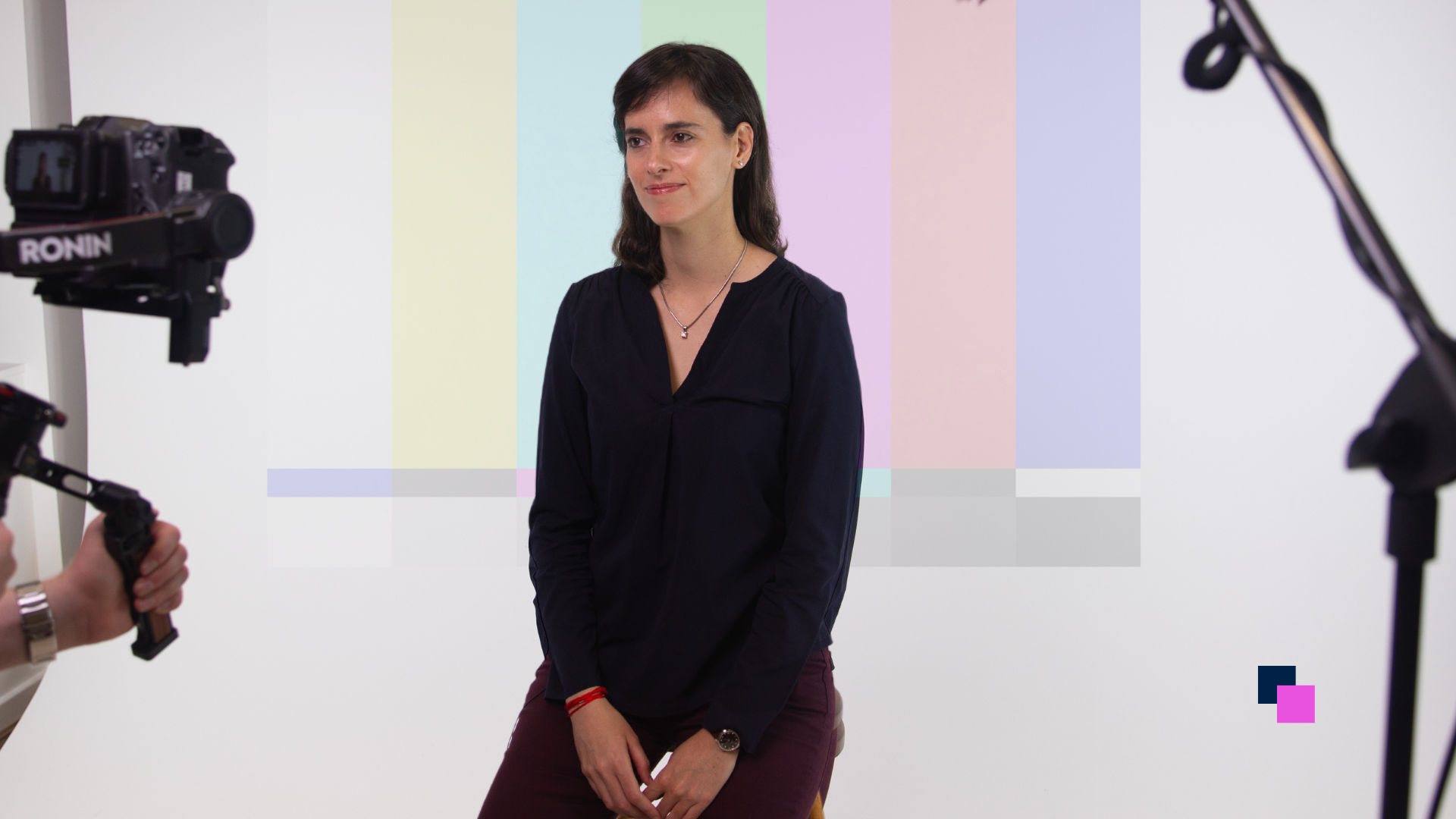Exploring the ethical complexities of AI.

Data is often referred to as the new oil.
People are online more than ever before, and are required to input their details to websites or online applications to perform essential tasks.
Meanwhile, algorithms are shaping what people see, what they buy, who they interact with, and what their options are.
Algorithms are affecting the outcomes of democratic elections, and are contributing to such important decisions as who gets a job and who goes to prison.
Professor Carissa Véliz on how AI is impacting democracy
A firm grip on people’s privacy and digital ethics has never been more important.
Professor Carissa Véliz is Associate Professor at the Institute for Ethics in AI at the University of Oxford.
She stands at the forefront of ethical inquiry in the realm of artificial intelligence.
Her remarkable career, extensive publications, and ground-breaking research achievements have positioned her as a leading voice in the field, shedding light on the profound implications of AI on society, privacy, and human values.
Her research centres on privacy and the ethics of algorithms.
‘I started my doctoral dissertation on a different topic. And then the Snowden revelations came out and it turned out that we were being mass surveilled.’
‘I looked into philosophy, as I had a lot of questions, and I didn't find many of the answers that I was looking for.’
When Professor Véliz discovered there was very little literature on the philosophy of privacy, and that the little there was, was quite outdated, she decided to change the topic of her dissertation.
Many of her mentors were nervous about the decision, but her supervisor supported the idea.
Working on privacy led her to the ethics of algorithms, because the kind of AI being used in so many facets of our daily lives right now, is machine learning, which tends to use troves of data, and much of that data is personal data.
She went on to write a book, ‘Privacy Is Power’, which became an Economist book of the year.
Her upcoming books, The Oxford Handbook of Digital Ethics (OUP, December 2023) and The Ethics of Privacy and Surveillance (OUP, January 2024) will undoubtedly contribute to better navigating the challenges we face with AI.
‘I wrote the book that I wish I could have read when I was starting to get interested in the topic and had a lot of questions’.
‘It’s a book about the life of our personal data. Everybody knows that your personal data has been collected, but do you know exactly what data and how it's being used and who has it and what happens to it once they've used it?’
She says it is also a very philosophical book because it explains how privacy interacts with concepts such as freedom, democracy, and autonomy.
Exactly how is it that having more data gives companies and institutions more power? And what can we do to redress that asymmetry of power that is creating so many problems?
Professor Véliz believes many of the problems we see regarding AI and digital tech have at their source, a problem of privacy and of misuse of personal data.
The book also includes a chapter for policymakers, where Professor Véliz argues that we should ban the trade in personal data.
‘For the same reasons that we don't buy or sell votes, we shouldn't buy or sell personal data, because it gets used much to the same effect.’
‘For instance, look at what happened with Cambridge Analytica. Even though Cambridge Analytica is here no more, there are hundreds of firms that using personal data to influence elections, and the laws still have not been changed to prevent that.’
‘With important elections looming around the world, the time for implementing better laws on the use and ownership of personal data right is now.’
Professor Véliz was drawn to Oxford both by the academic excellence of the university and by the city's beauty.
She is inspired by the buildings which, to her mind, represent temples to knowledge.
‘It's also a very good place to work because there are so many people working on AI from different angles: computer scientists, lawyers, anthropologists, political scientists, of course, philosophers.’
‘It's very enriching to have that kind of interdisciplinary approach and to have very different colleagues with very different backgrounds and very different views come together and talk about these topics.’
In a few years, Professor Véliz hopes that AI ethics will have become mainstream.
To further the impact of her research, Professor Véliz is actively involved in policy discussions, collaborating with governments and international organisations to develop frameworks that safeguard the interests of individuals in the AI age.
She has advised the UK House of Lords, the US Congress, and the European Commission, among others, and is part of UNESCO’s efforts to develop AI ethics.
To put this into perspective, Professor Véliz compares the situation with advances in medical technology and the ensuing ethical dilemmas.
Two things happened for medical ethics to really take off.
First, new technology that faced us with new challenges that we were not prepared to grapple with and in particular that doctors were not trained for.
Before the mechanical ventilator, it was quite easy to know whether somebody was alive: if they were breathing, they were alive, if they were not breathing, they were either dead or very close to being dead.
But with a mechanical ventilator, suddenly you have bodies that are warm.
Their hearts are beating, they are breathing, their nails are growing, their hair is growing. If they are pregnant, the foetus is developing.
They have a hormonal response to pain. And yet it seems like their brains are destroyed. Are these people alive? Are they dead? And more importantly, can we take their organs?
Professor Véliz explains that this is not a medical question. It is a value laden question. And it depends on what we think is a person.
‘And in the same way in AI ethics, we are seeing new technology that is presenting new challenges that we didn't have before.’
‘We never had the possibility of collecting so much personal data, much less analysing it.’
‘And now we do. And what do we do with it? Just because we can do something doesn't mean that we should.’
In the 1950s, most hospitals did not have an ethics committee, and doctors became doctors without ever having taken a course on medical ethics.
And now, of course, that is unimaginable. Every hospital you go to has an ethics committee, and there are ethics codes that regulate the behaviour of doctors and hospitals and research.
‘And the same should be true for AI ethics. Every computer scientist who develops an algorithm that has an impact in people's lives should have at least one course in AI ethics.’
‘And we should have codes to regulate these tools. We should see ethics as part of what it means to design and implement AI.’
The second thing that made medical ethics take off were scandals, like the Tuskegee scandal, that made it very tangible why we needed ethics.
We are seeing something similar with AI ethics, with scandals like Cambridge Analytica, other misuses of data, and algorithms being sexist and racist. Professor Véliz emphasises, it’s obvious why we need to develop AI ethics.
Ethics is about what is a good life and how do we structure society so that it is conducive to a good life.
Medical ethics is important because it has to do with life and death situations. But it is bounded up to the doctor's office and the hospital.
AI is everywhere. We are using it in policing, in sentencing, in how we distribute resources, in education, in industry and in the job market.
‘AI ethics touches all spheres of life. And if we invested in ethics even a quarter of the money that we invest in AI, I would be much more optimistic about the future.’
‘If we don't have good governance, we might find ourselves worse off than if we had never developed the technology.’
Professor Véliz's research achievements extend to her pioneering work on AI ethics.
Her investigations into the ethical implications of AI algorithms, data collection practices, and the potential for AI to exacerbate societal inequalities have earned her international acclaim.
In 2023, she received the Committed Optimist Award from the prestigious Spanish magazine, Anoche Tuve Un Sueño, for work that transforms the world into a better place.
Previous award winners include the Nobel Prize winner Shirin Ebadi and Noam Chomsky. In 2021, she received the Herbert A. Simon Award from the International Association for Computing and Philosophy for outstanding research.
She has explored the ethical complexities of AI decision-making, emphasising the importance of fairness, accountability, and transparency.
She has also investigated the implications of AI in healthcare, focusing on issues of patient privacy, medical decision-making, and the potential for AI to revolutionise healthcare services, while maintaining ethical standards.
Her work extends to questions of AI's impact on democratic societies, freedom of expression, and human autonomy, and her research provides a robust foundation for policymakers, scholars, and technologists to navigate the intricate moral terrain of AI.
This impact on the field of AI ethics is undeniable and positions her as a guiding light in a rapidly evolving field.
Her research and publications continue to inform and influence the discourse on AI ethics, shaping policies, best practices, and ethical guidelines for AI development and deployment worldwide.
As AI technology continues to reshape the world, Professor Véliz's work serves as a crucial reminder that the ethical dimensions of AI must not be overlooked, and that we need to ensure that AI serves humanity, rather than the other way around.
More #OxfordAI experts



